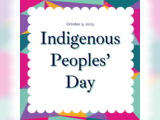Indigenous Peoples' Day
Celebrating and honoring Indigenous people and communities
Recognized each year on the second Monday of October, today we celebrate Indigenous Peoples' Day, a holiday to acknowledge all of our Indigenous communities across the United States. We honor, recognize, amplify and celebrate the impact, contributions, and history of Indigenous people and communities of this country.
Throughout history, Indigenous peoples have been erased and marginalized; misrepresented through racist and oppressive symbols/caricatures; and forced to prove their heritage, histories, and humanity. Still today, they continue to face brutality and disenfranchisement. Restitution for our Indigenous communities requires more than a day to honor and more than land acknowledgments. Elevating Indigenous voices, supporting Indigenous communities, and reflecting on inclusive practices that bring awareness to their joys and struggles is just the beginning. We must continue to challenge injustices against Indigenous peoples.
More about Indigenous Peoples' Day
In 2021, President Biden issued the first-ever presidential proclamation of Indigenous Peoples Day. The 2023 Indigenous Peoples’ Day Proclamation can be found here.
South Dakota was the first state to celebrate “Native American Day” in 1990 in opposition to “Columbus Day”.
Berkeley, California was the first city to celebrate Indigenous Peoples’ Day in 1992 as a protest to the 500th anniversary of Columbus’ arrival.
For centuries and even to this day, many continue to refer to this day as “Columbus Day” in reference to Christopher Columbus and his “discovery” of the New World. History has shown that Columbus was not the first to discover the Americas, and the celebration of “Columbus Day” ignores and erases the brutal treatment, genocide, and colonization of Indigenous peoples. Columbus’ first colonistic voyage led to the Bahamian Island of Guanahani (San Salvador) and the almost extinction of the Taino people. This voyage would be one of four in the name of Spain as the attempted erasure of the Indigenous peoples’ of The Bahamas and Caribbean.
Land acknowledgments are not the only answer to recognizing Indigenous peoples’, nor are they the only act of retribution. However, by acknowledging the land on which this university rests, we do recognize that more work is to be done. We endeavor to honor the Indigenous people who first stewarded this land; the history of the land; and work to address Indigenous peoples who have been forced from this place and rendered invisible. And so today and everyday, i3b shares the UMBC Land Acknowledgement to recognize and honor the Indigenous peoples that have come before us, those who are here with us in the present, and those who will come after us and all of their rich legacy and history.
UMBC was established upon the land of the Piscataway and Susquehannock peoples. Over time, citizens of many more Indigenous nations have come to reside in this region. We humbly offer our respect to all past, present, and future Indigenous people connected to this place.
Posted: October 9, 2023, 3:51 PM
